What is the best smart home system? is a very common search term on Google.
Unfortunately due to the differences in requirements, budget, devices and know how it is impossible to answer.
In this tutorial I want to give you an overview of the current systems that are available and a list of questions you should be asking when deciding on the best system for your home.
Smart home systems can be divided into three main categories.
- Commercial
- Community
- DIY
Commercial, Community and DIY Systems
For most people the sensible choice is a commercial system or a well established community one.
This is due to the fact that ongoing support for devices will be required, and also because people sell houses, and I wouldn’t think an unsupported system would be a good selling point.
However for learning home automation technologies building a DIY home automation system is ideal.
Commercial Systems
These can be divided into self install and professionally installed systems.
Self install
All smart home device manufacturers provide a smart home system that allows you to control their devices and they are, in the main, cloud based.
Popular ones are:
- Google Home
- Amazon Alexa
- Apple Homekit
- Samsung Smartthings
- Sonoff
- Tuya
Most of these require an Internet connection to work and some require a hub (Apple Homekit).
Of these Google Home appears to be the most popular as shown by the Google Trends Graph which I admit came as a surprise as I thought it was Alexa.
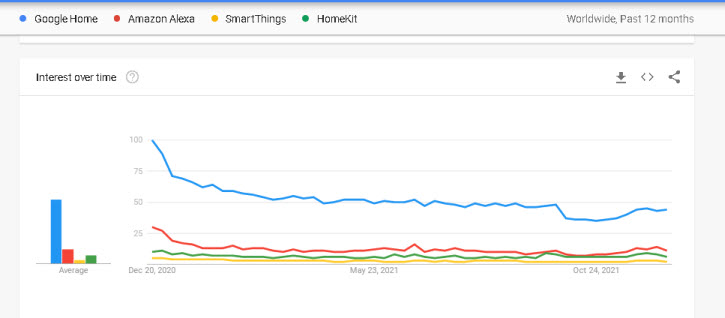
You can find a feature and price comparison here and here
Google, Amazon and Apple provide a voice assistant which requires access to the Internet to work.
Professionally Installed systems
The above systems are designed for self installations whereas others are designed for professional installation (e.g control4) and can only be purchased through an authorised dealer.
See home automation systems here for reviews of control4 and crestron.
The graph below shows the popularity on Google trends of the most popular professional installation systems compared to home assistant (open source).
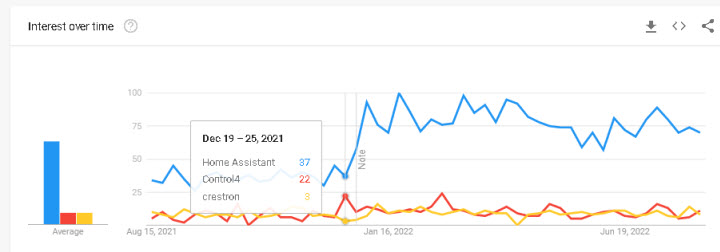
Community Systems
These are open source community projects.The most popular are
- Homeassistant
- domoticz
- Openhab
Of these homeassistant is by far the most popular as shown in the Google trends graph
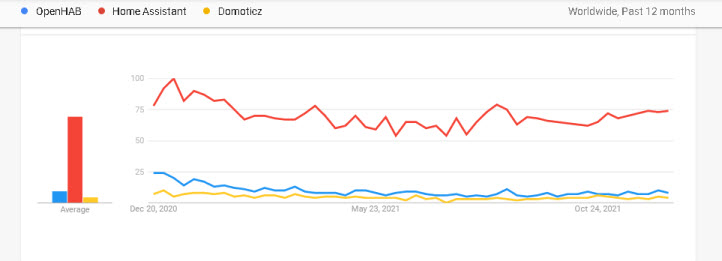
This article goes into much more detail on these systems and other that you may wish to consider.
DIY Home Automation Systems
If you are technical or just interested in learning more about home automation the you can build your own system.
The most common software platform to use is node-red, and the most common hardware choice is raspberry Pi but any computer system will work.
Dashboards and Voice Control
All smart home systems provide a dashboard for control and monitoring, and it is usually done on a mobile phone or tablet.
However the big three Google, Apple and Amazon provide voice control using a voice assistant.
How Voice Control Works
The following is specific to Amazon Alexa
but also applies to other current voice control systems.
The Amazon echo continuously listens for a wake up command which by default is Alexa.
Once it detects this command it sends the audio that follows to the Internet for decoding.
The Alexa personal assistant located in the cloud decodes the audio into text commands.
These text commands are processed by a program known as a skill, and Alexa responds accordingly.
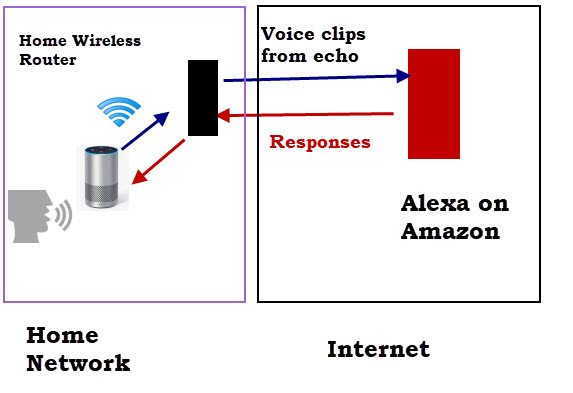
Although the diagram shows the skill sending a command to the device it usually sends the command to a web based App provided by the device manufacturer, which in turn sends the command to the device as shown below:
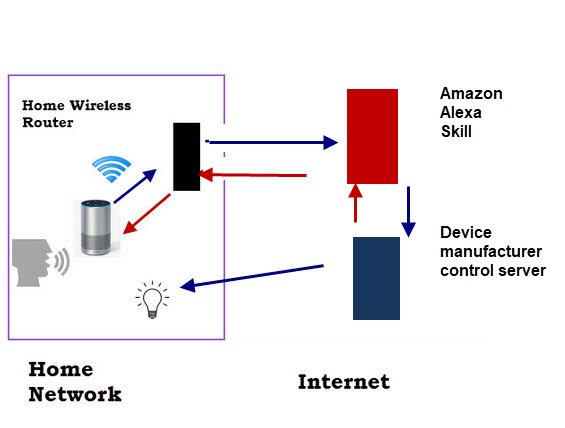
So When you see works with Alexa etc on a device it usually means that a skill exists that integrates the control platform of the manufacturer with Alexa.
This means that in order to work you need:
- A Wi-Fi Network
- An Internet connection
- An Amazon account
- A skill ( control code)
Amazon records these voice clips on your account, and this has raised a lot of privacy issue concerns.
The same is true of Google and Siri.
What To Look For In an Home Automation System
Here is a list of questions you should ask when choosing a smart home system?
- Does it require Internet access to work correctly?
- Does it require a high level of technical know how?
- Does it support your existing devices?
- Does it have a future?
- Does it require special hardware to function?
- Does it tie you to a particular provider?
- How will I hand this system over to new owners?
- Will it increase or decrease the value of my home?
Common Questions and Answers
Q- Can a device be controlled by multiple control systems
A- Yes usually.
Q- I’m using Google Home Can I switch to Alexa?
A- Again usually yes if a skill exists for that device.
Summary
There are many different types of home automation systems available and choosing the right one for you is not that straightforward.
For the non technical home owners the professionally installed approach is probably the best but more expensive choice.
If you find this too expensive then going with a major provider like Google is the next best choice but they mainly require an Internet connection to work correctly.
If you want local control first, and Internet control as an option then going open source using home assistant etc would be the next choice.
For hobbyists and those wanting to learn about Home automation then the DIY approach would be best.
Related tutorials and resources:
- Smart Home Hubs and Gateways
- Using HTTP To Control Smart Home Devices
- Smart Homes and MQTT
- Smart Home Thermostats and How They Work
- Controlling Smart Home Devices
- Smart Home Lighting Automation -Starter Guide